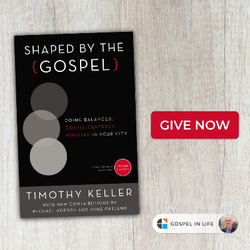
An Immigrant’s Courage

It takes tremendous courage to leave the land you’ve always lived in and permanently move to another land. People don’t usually do it unless they expect a better life. In the book of Ruth, we have the story of two immigrant women—Naomi and Ruth—who forge an amazing interracial sisterhood. But these women immigrate expecting to have not a better, but a worse life.
Naomi’s an old widow without hope, because in that society, she’s bereft of everything that could give her meaning. So Ruth goes with her to Israel, despite knowing that because she’s a Moabite, she’ll be hated. And yet, at the end of chapter 4, there’s joy. Why? Naomi has been redeemed.
If you look carefully, there’s an ambiguity in the text that points us to the secret of the story and the secret of our lives. To see this, let’s look at three redeemers in this story: 1) a formal redeemer, 2) a surprise, hidden redeemer, and then 3) a real redeemer.
This sermon was preached by Dr. Timothy Keller at Redeemer Presbyterian Church on October 19, 1997. Series: Pointers to Christ – Directional Signs in History. Scripture: Ruth 4:13-17.
Today's podcast is brought to you by Gospel in Life, the site for all sermons, books, study guides and resources from Timothy Keller and Redeemer Presbyterian Church. If you've enjoyed listening to this podcast and would like to support the ongoing efforts of this ministry, you can do so by visiting https://gospelinlife.com/give and making a one-time or recurring donation.
Featured Offer

Archives

 Learn How
Learn How
Featured Offer



